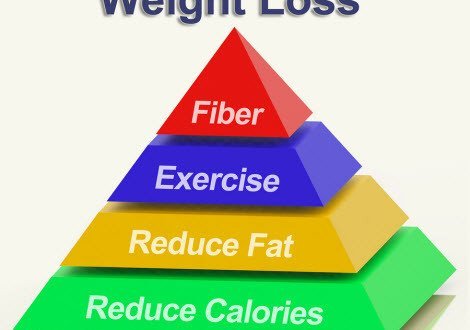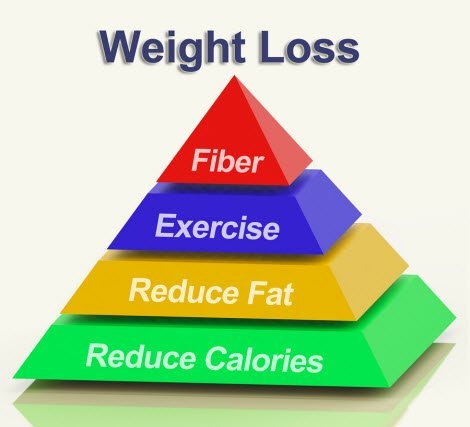Eating too much fat in your diet gets a bad press. It’s blamed for heart disease, high cholesterol, weight gain. So how bad is it and how much is too much?
Fat is one of the three macro nutrients along with protein and carbohydrate that your body requires for optimal health. Dietary fat, the fat you eat is an important component of every meal you eat.
However, from a health perspective, most of the western developed world has got the balance wrong.
Fat in Your Diet – Why is it Important…?
Fat has an important role in the diet, but in today’s society it’s often a bad one.
Too much saturated fat in your diet is linked to heart disease and high blood cholesterol and certain cancers, colon cancer for instance.
It’s also linked to weight gain and obesity. Hence, most healthy weight loss plans are based on a diet low in fat, saturated fat in particular.
Fat is highly calorific, it’s a concentrated source of energy and in all animals is the main energy store.
Fat contains 9 calories per gram, whilst protein contains 4 calories per gram and carbohydrate 3.5 calories per gram. That’s a whopping 120 calories in a tablespoon of oil. You didn’t think like that before! Or do you?
Clearly, eating a lot of fat in your diet means you’ll be packing in a lot more calories per mouthful.
However, you do need to eat some fat so your body can utilize the fat soluble vitamins A,D,E and K, for instance.
Fat in Your Diet – What Type of Fat Should You Eat?
Whilst certain food sources are classified as high in one of these, they in fact contain all three, it’s just that there’s a higher proportion of one or the other.Fats are classified as saturated, monounsaturated or polyunsaturated dependent on their molecular structure.
Saturated fats
Saturated fats are generally solid at room temperature and include animal fat, lard, butter, cream, cheese, most animal products.
There are also vegetable sources that contain mostly saturated fats – palm oil and coconut oil for instance.
Saturated fats are commonly referred to as ‘bad’ fats because a diet high in them increases the risk of heart disease and stroke.
Extensive research has shown that saturated fats are deposited in the lining of the arteries, narrowing the arterial bore and increasing blood pressure.
They also make blood cells sticky, leading to blood clots, which increase the incidence of heart attacks and strokes as they become lodged in arteries, blocking blood flow.
Unsaturated fats
Unsaturated fats are liquid at room temperature and can be either mono- or polyunsaturated.
Vegetable oils such as olive, peanut and canola are high in monounsaturates.
Vegetable oils such as corn, sunflower and soyabean oils are high in polyunsaturates.
Fish oils are also high in unsaturates as are vegetables like olives, avocados, most nuts and seeds.
Omega 3 essential fatty acids are a good example and there are also emerging links between omega 3 and weight loss.
Unsaturates are commonly referred to as ‘good’ fats as they have been shown to reduce the risk of heart disease.
Put simply, unsaturates act as a taxi service, ferrying saturates back to the liver to be burnt. Eat a high proportion of unsaturates to saturated fat in your diet and the risks of heart disease can be reduced.
And what about cholesterol?
Cholesterol is a waxy, fat-like substance. It’s crucial for good health as it, for instance, plays a vital role in nervous function.
Your liver makes most of the cholesterol you need, and many people with high blood cholesterol have high levels because their body makes too much, not because of their diet.
All dietary cholesterol comes from animal fat products.
High blood cholesterol is one of the big three heart disease risk factors along with high blood pressure and smoking.
So, it is very good if you can avoid cholesterol for the betterment of your health.
Fat in Your Diet – So How Much Should You Eat, Then?
The chances are that if you’re overweight you eat too much fat in your diet. You can be fatty if you pass very idle life. But we will not discuss that in this article now.
In fact, surprise, surprise, high fat consumption despite the current preoccupation with carbs, is still one of the main reasons that people are overweight and obese.
The reason we tend to eat too much fat is because it tastes good. We’re genetically programmed to seek out and eat fat.
The reason being that for most of human history food has been scarce and as fat contains the most calories per gram, it’s a valuable source of energy.
Hence, you got more energy in each mouthful and increased your chances of survival.
In the developed world, food is plentiful and this fondness for the taste of fat and our compulsion to eat it has helped to make us fat.
A somewhat cynical food industry knows this and has helped this process along. Most processed foods are high in fat, particularly saturated fats, to make them taste good – think chocolate, chips, pastries…
And when you combine fat with sugar, you’ve got an obesity time bomb just waiting to explode (which it has!).
What Study or Researchers say?
According to bodies such as the UK’s Department of Health and the American Heart Foundation, the maximum healthy proportion of your dietary calories that should come from fat is 30%.
The problem is most of us in developed countries eat around 35% on average.
Nearer to 20% would be ideal. 20% is the healthy minimum.
In fact eating less than 20% of calories from fat in your diet can be difficult as you’ll be ruling out a number of foods important to your health from your diet to achieve it.
It will also be a pretty bland diet with so little fat and pretty hard to stick to in the long term.
So, what does that mean? 30%?
Well, everyone has different calorific requirements so the amount of fat in your diet you need will vary. Generally speaking, the more calories a day you need, the more fat you can eat.
As a rough guide:
- Moderately active adult women need around 2,200 calories a day
- Women over 50 around 1,900 calories a day
- Moderately active adult men need around 2,900 calories a day
- Men over 50 around 2,300 calories a day
This is a rough guide as your calorie intake will vary greatly with your height, weight, level of muscular development, activity levels, metabolic rate and so on.
So:
- A woman eating 2,200 calories a day will have a maximum fat intake of 73 grams a day
- With 1,900 calories that reduces to 63 grams a day
- A man eating 2,900 calories a day can eat 97 grams a day
- On 2,300 calories a day that’s 77 grams of fat a day
As an easy way of working out your daily requirements, 2,000 calories a day equates to 65 grams of fat a day. Add 3 grams of fat for every 100 calories over 2,000 and take off 3 grams for every 100 calories under 2,000.
You must maintain a Proportion between Saturated and unsaturated Fat…
Just to complicate things, don’t forget that in the 30% of fat in your diet each day, you need to get the proportion of saturates to unsaturates right.
This is probably more important than the amount of fat you eat as far as your heart health is concerned.
The proportion of unsaturated fats to saturates to protect against heart disease should be around 2:1. For many people it’s 1:2!
Generally speaking, your daily intake of fat should consist of:
- A max of 10% from saturated fat
- A max of 10% from polyunsaturated fat
- A minimum of 10% from monounsaturated fat
Again, as a rough guide you should aim to eat a third of each type of fat in your diet, less saturated fat as a proportion if possible. As much as you can follow this, you will be able to lose weight for longer time period.
Our advice?
Read a few food labels to use as a guide, but generally speaking eat fewer fatty foods and more fruit and veg.
Don’t get too hung up on the different types of fat. If weight loss is your goal, the distinction between good and bad fats is all well and good, but they both contain the same number of calories.
By all means eat more olive oil compared to butter. But cut down on the overall amount of fat in your diet to 20%-30% of your daily calorie intake. You have to do this if you want to lose weight and keep it off.
I hope all of our tips will work for you. We worked hard to find out the best solution for your weight loss program. We tried to overcome the myths people have about fat. Fat is a very important element of the foods. You should consume it. But you have to limit your intake and choose which foods are worth to eat. This will really help you in weight loss and free yourself from being obese.
If you have any query or any information, that can help to improve this article, then please contact us. We will get back to you with our reply.
 Weight Loss for Busy People Best Fitness Blog
Weight Loss for Busy People Best Fitness Blog




